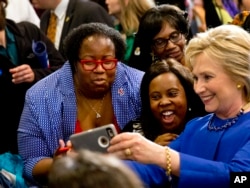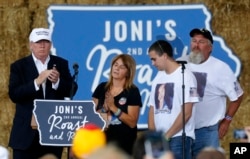U.S. Republican presidential contender Donald Trump is making repeated appeals for support from African-American voters at the unlikeliest of venues, at rallies where almost all the voters are white.
Trump made his latest pitch for black votes Saturday at a political rally in the Midwest farm state of Iowa, telling the largely white crowd that he blamed decades of Democratic policies for the "deplorable conditions in many of our inner cities." He has called Hillary Clinton, his Democratic opponent in the November 8 presidential election, a bigot for not improving the plight of blacks and Hispanics.
“As a father, as a builder, as an American," Trump said, "it offends my sense of right and wrong to see anyone living in such conditions. They are living in terrible, terrible conditions. Beyond belief: bad, bad, bad.”
Clinton leads among blacks, Hispanic voters
National political surveys show Clinton has amassed a huge lead over Trump among black and Hispanic voters, the fastest growing segment of the American electorate, while he holds a much smaller lead among white voters.
Political analysts say his appeal for minority voters is aimed at cutting into Clinton's edge among black and Hispanic voters, but also an effort to win more support from women and politically moderate Republicans who might be inclined to support Clinton because they view Trump as a racist.
From the earliest days of his campaign, Trump branded undocumented immigrants pouring over the Mexican border into the U.S. as rapists and criminals. He continues to call for construction of a border wall to thwart the stream of migrants entering the United States, a signature of his campaign, but has wavered with shifting positions in the last few days about his vow to deport all 11 million undocumented immigrants living in the United States to their home countries.
The New York Times said in a story Sunday that Trump, a real estate tycoon seeking his first elected office, and his late father discriminated against blacks to keep them from renting apartments at the New York buildings they developed in the 1970s, settling a lawsuit the U.S. government brought against them alleging racial bias without admitting guilt.
Trump's campaign says he plans to visit black communities in the coming weeks to make direct appeals for their support, including a stop in the Midwest city of Detroit, Michigan, the beleaguered hub of the U.S. auto industry.
Clinton's accusations
Several days ago, Clinton aimed her sharpest attacks of the campaign against what she said was Trump's affinity for supporting racially exclusionary groups.
"From the start, he has built his campaign on prejudice and paranoia," she told one interviewer Friday, "And it's deeply disturbing that he is taking hate groups that lived in the dark regions of the Internet, making them mainstream, helping a radical fringe take over the Republican Party.
"And what I want to make clear is this:" she said, "A man with a long history of racial discrimination drawn from the pages of supermarket tabloids and these kind of white supremacist, white nationalist, anti-Semitic groups should never command our military. If he doesn't respect all Americans, how can he serve all Americans?"
'Criminal illegal immigrants'
In Iowa, Trump promised that he will begin removing "hundreds of thousands of criminal illegal immigrants" from the U.S. on his first day in office if he is elected.
Trump also said he will track people who enter the country on visas and ensure they leave when the visas expire.
"If we don't enforce visa expiration dates, then we have an open border -- it's as simple as that," Trump said.
He also said a nationwide verification program will prevent non-citizens from obtaining welfare and other social benefits. But he did not offer any details on how he would deal with the 11 million undocumented immigrants living in the U.S.
At various times in the last few days, he has said he would deport those convicted of crimes, but let others stay if they paid back taxes they owed. Still later, he suggested undocumented immigrants would have to leave the country before returning if they want to pursue U.S. citizenship.
Security briefings
Clinton received a two-hour national security briefing Saturday, her first since becoming the Democratic nominee last month.
The overview of major domestic and global threats facing the U.S. was conducted at a federal government facility near her home outside New York.
Major presidential nominees and their close advisers are legally required under U.S. law to be briefed with classified information on security matters by the Office of the Director of National Intelligence so they will be prepared when they assume office next January as President Barack Obama completes two terms in office.
Trump received a similar security briefing earlier this month that reportedly lasted more than two hours.
Such briefings have been routinely given to presidential contenders by national intelligence officials for about 60 years.








